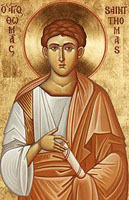In common with most of the Apostles, frustratingly little is known for certain about Thomas or his life. He has long been known as Didymus, meaning twin, and some ancient writers took this to mean that he was Jesus' twin. He is also known as Doubting Thomas, after the episode in the Gospel of John where he refuses to believe that Christ has risen from the dead until he has touched him.
Legend has it that when the Apostles dispersed to spread the word of Jesus after the Crucifixion, Thomas sailed east, eventually making his way to India.
Thomas is remembered mainly as the disciple who would not accept Jesus' resurrection without proof. This unflattering portrait might reflect the fact that the early Church, which was responsible for assembling the canonical New Testament, was locked in a bitter struggle with the Gnostic sects, for whom Thomas was a key figure. They believed that Jesus had imparted secret knowledge to Thomas alone.
Many ancient writers credited Thomas with establishing the Christian Church in India. It's entirely possible that he did, as the Church there is very old, but no-one knows for sure.
The Gnostics also circulated a number of writings which they attributed to Thomas, including the so-called Gospel of Thomas. Long thought lost, this was rediscovered in 1945 in the Egyptian village of Nag Hammadi. It contains almost no historical anecdote about the life of Jesus, concentrating instead on preserving his sayings, and is presented as containing secret or mystical knowledge for Gnostic initiates only.
According to a text known as the Acts of Thomas, he met his end in India. A local king who was angry at his success in converting the populace had him stoned and then stabbed to death.
The tales of Thomas' work in India set the tone for many future missionaries. As one of Jesus' disciples, he is naturally honoured as a saint in all Christian traditions that honour saints at all, though his early association with the Gnostic tradition perhaps coloured his reputation in the mainstream Church.














